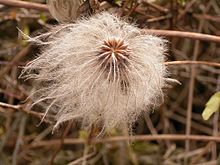Clematis serratifolia, the Korean clematis, is a species of flowering plant in the family Ranunculaceae, native to Khabarovsk and Primorsky Krais of the Russian Far East, Manchuria, and the Korean Peninsula.[1][2] A deciduous climber reaching 3 to 4 m (10 to 13 ft), in the wild it is often found growing in calcareous soils, but can handle acidic soil as well. As an ornamental it is grown for its citrus-like floral aroma and its fluffy seedheads, and is recommended for courtyards, walls, borders, and the like.[3][2]
| Clematis serratifolia | |
|---|---|

| |
| Twining on a fence | |

| |
| Seedhead | |
| Scientific classification | |
| Kingdom: | Plantae |
| Clade: | Tracheophytes |
| Clade: | Angiosperms |
| Clade: | Eudicots |
| Order: | Ranunculales |
| Family: | Ranunculaceae |
| Genus: | Clematis |
| Species: | C. serratifolia
|
| Binomial name | |
| Clematis serratifolia | |
| Synonyms[1] | |
|
List
| |
References
edit- ^ a b "Clematis serratifolia Rehder". Plants of the World Online. Royal Botanic Gardens, Kew. Retrieved 28 January 2023.
- ^ a b "Clematis serratifolia Korean clematis". The Royal Horticultural Society. 2023. Retrieved 28 January 2023.
4 suppliers
- ^ Fern, Ken (12 October 2022). "Useful Temperate Plants Clematis serratifolia Rehder Ranunculaceae". temperate.theferns.info. Temperate Plants Database. Retrieved 28 January 2023.